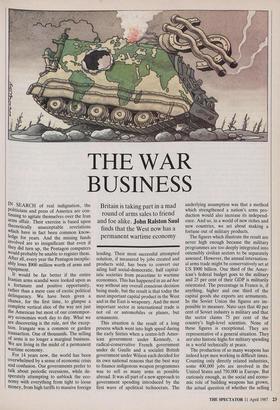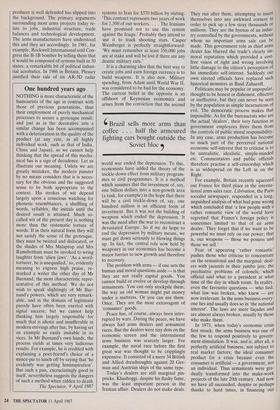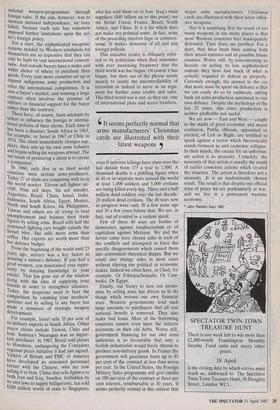THE WAR BUSINESS
Britain is taking part in a mad round of arms sales to friend and foe alike. John Ralston Saul finds that the West now has a permanent wartime economy
SEARCH of real indignation, the Politicians and press of America are con- tinuing to agitate themselves over the Iran arms affair. Their exercise is based upon theoretically unacceptable revelations Which have in fact been common know- ledge for years. And the missing funds involved are so insignificant that even if they did turn up, the Pentagon computers would probably be unable to register them. After all, every year the Pentagon inexplic- ably loses $900 million worth of arms and equipment.
It would be far better if the entire Iranian arms scandal were looked upon as a fortunate and positive opportunity, rather than a mere case of exotic political delinquency. We have been given a chance, for the first time, to glimpse a Complete vertical slice of the way not just the American but most of our contempor- ary economies work day to day. What we are discovering is the rule, not the excep- tion. Irangate was a common or garden transaction. One of thousands. The selling of arms is no longer a marginal business. We are living in the midst of a permanent wartime economy. For 14 years now, the world has been overwhelmed by a sense of economic crisis and confusion. Our governments prefer to talk about periodic recessions, while de- sperately attempting to unblock the eco- nomy with everything from tight to loose money, from high tariffs to massive foreign lending. Their most successful attempted solution, if measured by jobs created and products sold, has been to convert our ailing half social-democratic, half capital- istic societies from peacetime to wartime economies. This has happened in an ad hoc way without any overall conscious decision being made, but the result is that today the most important capital product in the West and in the East is weaponry. And the most important sector in international trade is not oil or automobiles or planes, but armaments.
This situation is the result of a long process which went into high speed during the early Sixties when a centre-left Amer- ican government under Kennedy, a radical-conservative French government under de Gaulle and a socialist British government under Wilson each decided for its own national reasons that the best way to finance indigenous weapon programmes was to sell as many arms as possible abroad. It was all part of a new approach to government spending introduced by the first wave of apolitical technocrats. The underlying assumption was that a method which strengthened a nation's arms pro- duction would also increase its independ- ence. And so, in a world of new riches and new countries, we set about making a fortune out of military products.
The figures which illustrate the result are never high enough because the military programmes are too deeply integrated into ostensibly civilian sectors to be separately assessed. However, the annual internation- al arms trade might be conservatively set at US $900 billion. One third of the Amer- ican's federal budget goes to the military and 25 per cent of their GDP is militarily orientated. The percentage in France is, if anything, higher and one third of the capital goods she exports are armaments. In the Soviet Union the figures are im- possible to measure. Nato says that 40 per cent of Soviet industry is military and that the sector claims 75 per cent of the country's high-level scientists. None of these figures is exceptional. They are representative of a general situation. They are. also historic highs for military spending in a world technically at peace.
The production of so many weapons has indeed kept men working in difficult times. Counting only directly related industries, some 400,000 jobs are involved in the United States and 750,000 in Europe. But curiously enough, as the social and econo- mic role of building weapons has grown, the actual question of whether the selling producer is well defended has slipped into the background. The primary arguments surrounding most arms projects today re- late to jobs, industrial structure, trade balances and technological development. The arms manufacturers have understood this and they act accordingly. In 1981, for example, Rockwell International sold Con- gress the B-1B bomber by telling them that it would be composed of systems built in 50 states; a remarkable bit of political indust- rial acrobatics. In 1986 in Britain, Plessey justified their sale of six AR-3D radar systems to Iran for $370 billion by stating: 'This contract represents two years of work for 1,500 of our workers. . . . The Iranians have promised not to use this system against the Iraqis.' Probably they intend to use it to track shooting stars. Casper Weinberger is perfectly straightforward: 'We must remember at least 350,000 jobs are at stake and will be lost if there are any drastic military cuts.'
It is a charming idea that the best way to create jobs and earn foreign currency is to build weapons. It is also new. Military spending, from Adam until World War II, was considered to be bad for the economy. The current belief in the opposite is an offshoot of Keynesian economics and arises from the conviction that the second 4 Brazil sells more arms than coffee . . . half the armoured fighting cars bought outside the Soviet bloc world war ended the depression. To this, economists have added the theory of the trickle-down effect from military program- mes to civil programmes. It is a method which assumes that the investment of, say, one billion dollars into a non-growth area (a tank, for example) in the hope that there will be a civil trickle-down of, say, one hundred million is an efficient form of investment. But it was not the building of weapons which ended the depression. It was the need after the war to reconstruct a devastated Europe. So if we do hope to end the depression by military means, we must get down seriously to blowing things up. In fact, the central role now held by weaponry in our economies has become a major barrier to new growth and therefore to recovery.
The problem with arms — if one sets the human and moral questions aside — is that they are not really capital goods. You cannot build or evolve or develop through armaments. You can only stockpile them, the way an old woman might put money under a mattress. Or you can use them. Once. They are the most extravagant of 'consumer' goods.
Peace has, of course, always been inter- rupted by wars. During the peace, we have always had arms dealers and armament races. But the dealers were tiny dots on the economic screen and the international arms business was scarcely larger. For example, the naval race before the first great war was thought to be cripplingly expensive. It consisted of a mere 34 British and Allied dreadnoughts against 20 Ger- man and "Austrian ships of the same type.
Today's dealers are still marginal pin- pricks. Khashoggi, despite his flashy fame, was the least important person in the Iranian affair. Dealers do not make deals. They run after them, attempting to insert themselves into any awkward corners 111 order to pick up a few stray thousands or millions. They are the hyenas of an indus- try controlled by the governments, without whom no important arms sale can be made. This government role as chief arms dealer has blurred the trade's clearly im- moral reputation which provided a cost- free vision of right and wrong involving little damage to the citizen's perception of his immediate self-interest. Suddenly our own elected officials have replaced such historical monsters as Basil Zaharoff.
Politicans may be popular or unpopular, thought to be honest or dishonest, effective or ineffective, but they can never be seen by the population as simple incarnations of evil. The democratic process makes that impossible. As for the bureaucrats who are the actual 'dealers', their very function as government employees frees them from the controls of public moral responsibility. In any case, arms production has become so much part of the perceived national economic self-interest that to criticise is to be unrealistic, idealistic, simple-minded etc. Commentators and public officials therefore practise a self-censorship which is as widespread on the Left as on the Right.
For example, Britain recently squeezed out France for third place in the interna- tional arms sales race. Liberation, the Paris socialist newspaper, responded in a long, anguished analysis of what had gone wrong which concluded that 'a few people with a rather romantic view of the world have regretted that France's foreign policy is sometimes limited to that of an arms dealer. They forget that if we want to be powerful we must rely on our power; that is, our weapons — those we possess and those we sell.'
Fear of appearing 'rather romantic' pushes those who criticise to concentrate on the sensational and the marginal: deal- ers with jacuzzis in their jumbo jets; the psychiatric problems of colonels; which official said what to a president at what time of the day in which room. In reality, even the favourite questions — who lied, what law was broken, who knew — are now irrelevant. In the arms business every- one lies and usually does so in 'the national interest'. The laws are mere facades and are almost always broken, usually by those who make them.
In 1973, when today's economic crisis first struck, the arms business was one of the few to respond positively to govern- ment stimulation. It was, and is, after all, a perfectly artificial business, not subject to real market factors; the ideal consumer product for a crisis because even the consumer is artificial — a government, not an individual. Thus armaments were gra- dually transformed into the make-work projects of the late 20th century. And now we have all succeeded, despite or perhaps thanks to hard times, in financing our national weapon-programmes through foreign sales. If the aim, however, was to increase national independence, we have failed, because each sale has somehow imposed further limitations tipon the sel- ler's foreign policy. For a start, the sophisticated weapons- systems needed by Western producers for themselves are so expensive that they can only be built by vast international consort- iums. And outside buyers have a wider and Wider choice of where to purchase their goods. Every year more countries set up or expand indigenous arms production and enter the international competition. It is now a buyer's market, and winning a large contract often involves the promise of military or financial support for the buyer rather than the contrary. There have, of course, been attempts by sellers to influence the foreign or interna- tional policies of their clients. Each time it has been a disaster; South Africa in 1963, for example, or Israel in 1967 or Chile in 1974. The client immediately changes sup- pliers, then sets up his own arms industry and begins selling his weapons abroad. The net result of pressuring a client is to create a competitor. In 1960, only five or so third world countries were serious arms-producers. Today 27 of them are competing with us in the world market. Eleven sell fighter air- craft. Nine sell ships. Six sell missiles. Argentina, Brazil, China, Israel, India, Indonesia, South Africa, Egypt, Mexico, North and South Korea, the Philippines, Taiwan and others are all trying to beat unemployment and balance their trade figures by selling arms. Brazil sells half the armoured fighting cars bought outside the Soviet bloc. She sells more arms than coffee. Her exports are worth more than her defence budget. From the beginning of the world until 25 Years ago, secrecy was a key factor in assuring a nation's defence. If you had a good weapon, you maintained your super- iority by denying knowledge to your enemy. That has gone out of the window along with the idea of supplying your friends in order to strengthen alliances. Today, the desperate need to beat the competition by vaunting your products' qualities and by selling to any buyer has made a nonsense of strategic weapon development. For example, Israel sells 35 per cent of its military exports to South Africa. Other major clients include Taiwan, Chile and Iran. Somoza's Nicaragua was an impor- tant purchaser. In 1983, Brazil sold planes to Honduras, endangering the Contadora regional peace initiative it had just signed. Vickers of Britain and FMC of America have developed an armoured personnel carrier with the Chinese, who are now selling it to Iran. China also sells fighters to both Iran and Iraq. Sweden, forbidden by its own laws to supply belligerents, has sold $200 million worth of arms to Singapore, who has sold them on to Iran. Iraq's main suppliers ($40 billion up to this point) are the Soviet Union, France, Brazil, South Africa, and China. It is a list which does not make any political sense. In fact, none of the preceding involves logic or common- sense. It makes nonsense of all and any foreign policies.
This macabre reality is obliquely refer- red to by politicians when they announce with ever increasing frequency that the third world war has begun. Of course it has begun, but their use of the phrase seems merely to justify the uncontrollability of terrorism or indeed to serve as an argu- ment for further arms credits and sales. This third world war is not, as they say, one of international plots and secret bombers, 4 It seems perfectly normal that arms manufacturers' Christmas cards are illustrated with their latest weapons even if terrorist killings have risen over the last decade from 175 a year to 1,000. A thousand deaths is a piddling figure when in 40 or so separate wars around the world at least 1,000 soldiers and 5,000 civilians are being killed every day. Three and a half million dead soldiers over the last decade; 20 million dead civilians. The 40 wars now in progress were only 30 a few years ago and 20 a few years before that. We are, in fact, out of control in a violent spiral.
Few of these 40 wars are battles of democracy against totalitarianism or of capitalism against Marxism. We and the Soviet camp have chosen sides in each of the conflicts and attempted to force the specific disagreements which caused them into convenient rhetorical shapes. But we could also change sides in most cases without altering our political or economic stakes. Indeed we often have, in Chad, for example. Or Ethiopia/Somalia. Or Cam- bodia. Or Egypt.
Finally, our frenzy to save our econo- mies by selling arms has driven us to do things which worsen our own financial state. Western governments lend such large amounts to purchasers that all real national benefit is removed. They also make bad loans. Most of the borrowing countries cannot even meet the interest payments on their old debts. Worse still, government financing for our own arms industries is so favourable that only a foolish industrialist would freely choose to produce non-military goods. In France the government will guarantee loans up to 85 per cent of the contract at less than seven per cent. In the United States, the Foreign Military Sales programme will give credits on 100 per cent of the contract at three per cent interest, reimbursable in 30 years. It seems perfectly normal in this context that major arms manufacturers' Christmas cards are illustrated with their latest offen- sive weapons.
Nor is it surprising that the result of too many weapons in too many places is that most Western countries feel inadequately defended. Their fears are justified. For a start, they have been busy arming both their actual enemies and all possible future enemies. Worse still, by concentrating so heavily on selling to less sophisticated nations they have lost track of what is actually required to defend us properly. Curiously enough, the answer to the cry that more must be spent on defence is that we can easily do so by ruthlessly cutting back on arms-production unrelated to our own defence. Despite the mythology of the last 25 years, this extra production is neither profitable nor useful.
We are now — East and West — caught in the midst of great economic and moral confusion. Public officials, appointed or elected, of Left or Right, are terrified to speak against a sector which theoretically stands between us and economic collapse. In their minds, the excuse for an unfortun- ate action is its necessity. Unluckily, the necessity of that action is usually the result of earlier conscious actions which created the situation. The action is therefore not a necessity. It is an inadvertently chosen result. The result is that despite our official state of peace we are permanently at war, and we live in a permanent wartime economy.
o John Ralston Saul 1987


























































 Previous page
Previous page